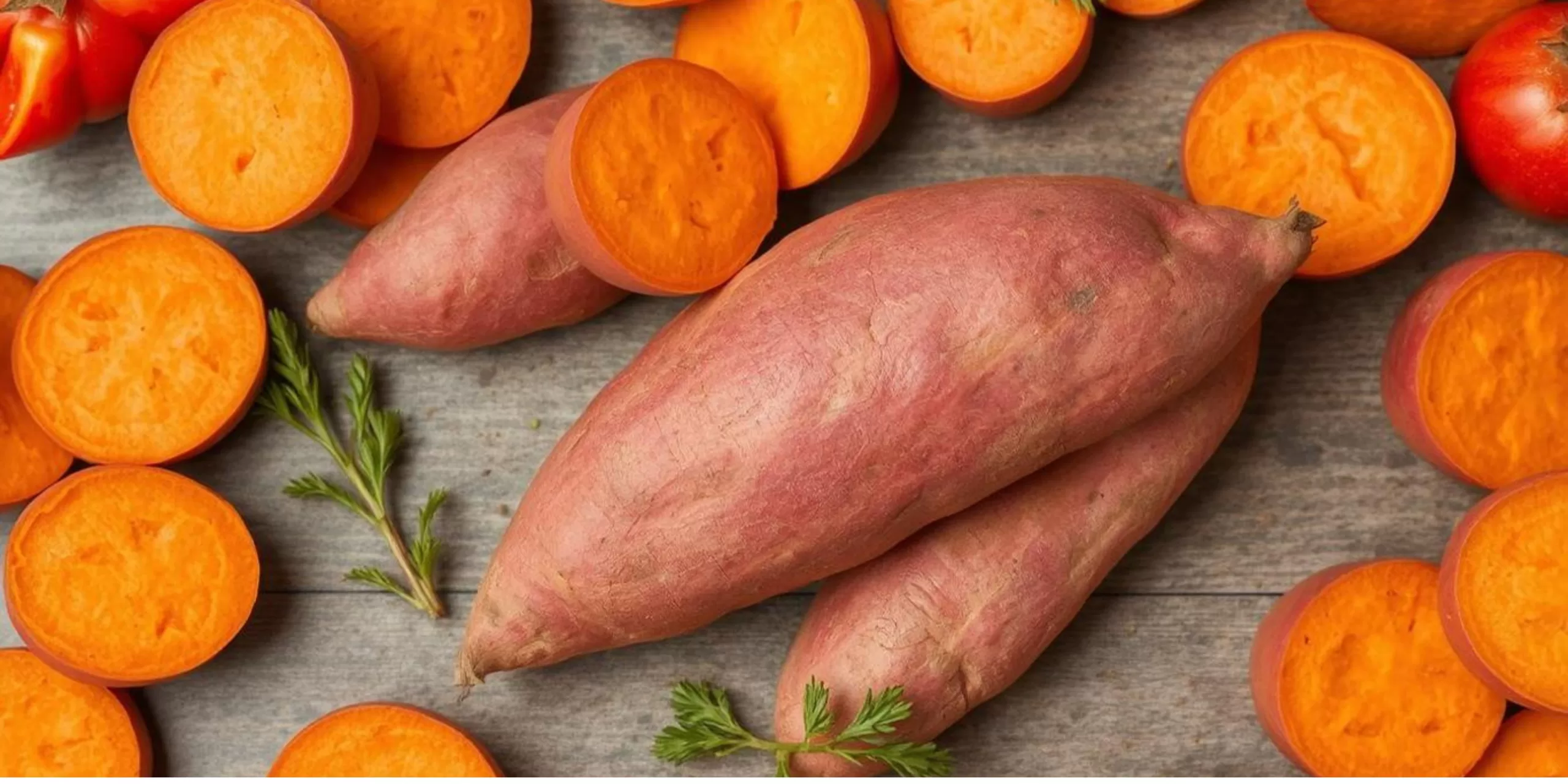

Dt. Natasha Mohan
Dietitian Natasha Mohan is one of the most influential and renowned nutritionist and dietitian, with over 3 Million Followers on YouTube and 200+ Million Views and with 10+ Years of Experience. Dietitian Natasha Mohan is a transformation expert, Motivational Speaker and Lifestyle Expert. She has touched million of lives. She specializes in Therapeutic Diets Like, PCOS/PCOD, Thyroid, Diabetes, Cholesterol, Blood pressure, and other lifestyle disorder.
Table of Contents
Sweet Potato Diet: Benefits, Recipes, and Weight Loss Tips
Sweet potatoes aren’t just another vegetable. They’re a vibrant, versatile superfood that can transform your health, tantalize your taste buds, and even help you shed those extra pounds. If you’ve been struggling to find a diet that’s healthy yet indulgent, the sweet potato diet might just be your answer. Let’s dive deep into this nutritional powerhouse and uncover why it deserves a place in your kitchen.
Sweet Potato Diet: A Delicious and Nutritional Journey
What Is the Sweet Potato Diet?
The sweet potato diet revolves around the idea of making sweet potatoes the star of your meals. Why? Because they’re rich in nutrients, easy to prepare, and naturally sweet, making healthy eating feel less like a chore and more like an indulgence.
Imagine waking up to a creamy sweet potato smoothie, enjoying a hearty Buddha bowl for lunch, and ending your day with a perfectly roasted sweet potato topped with avocado. Doesn’t that sound like heaven on a plate?
Why Sweet Potatoes Are a Game-Changer
Sweet potatoes are more than just a side dish. They’re a nutritional powerhouse that supports your overall health while helping you maintain or lose weight. Unlike many carb-heavy foods, sweet potatoes are nutrient-dense, making them the perfect addition to your diet.
Nutritional Powerhouse
High in Fiber
Sweet potatoes are loaded with dietary fiber, which helps keep you full longer, supports healthy digestion, and prevents those annoying energy crashes throughout the day.
Packed with Vitamins and Minerals
From vitamin A to potassium, sweet potatoes are brimming with essential nutrients. Vitamin A is particularly abundant, playing a critical role in eye health and immune function.
Low in Calories but High in Satisfaction
Despite their natural sweetness, sweet potatoes are surprisingly low in calories. You can enjoy a generous serving without feeling guilty.
Health Benefits of Sweet Potatoes
Supports Digestive Health
The fiber in sweet potatoes helps promote regular bowel movements and keeps your gut healthy.
Boosts Immunity
Packed with antioxidants and vitamins, sweet potatoes can strengthen your immune system, helping you fight off colds and infections.
Promotes Heart Health
Their high potassium content helps regulate blood pressure, reducing the risk of heart disease.
Fights Inflammation
Sweet potatoes contain anti-inflammatory compounds that can reduce inflammation and alleviate symptoms of chronic conditions.
Sweet Potatoes for Weight Loss
Low-Calorie and Filling
Sweet potatoes are a low-calorie food that provides a feeling of fullness. This means you can eat less while staying satisfied.
Controls Blood Sugar Levels
Despite their sweetness, sweet potatoes have a low glycemic index, which helps stabilize blood sugar levels and prevent energy crashes.
Curbs Cravings Naturally
Their natural sweetness satisfies your sugar cravings without the need for processed snacks or desserts.
How to Start the Sweet Potato Diet
Incorporating Sweet Potatoes into Daily Meals
Start small—maybe a sweet potato smoothie for breakfast or roasted wedges as a side dish. Gradually make them a staple in your meals.
Suggested Serving Sizes
Aim for one medium-sized sweet potato per meal. Balance it out with lean proteins and leafy greens for a complete meal.
Tips to Maximize Weight Loss
- Stick to whole, unprocessed sweet potatoes.
- Avoid frying; opt for baking, steaming, or boiling instead.
- Combine sweet potatoes with high-protein and high-fiber foods.
Sweet Potato Recipes to Try
Breakfast: Sweet Potato Smoothie Bowl
Blend steamed sweet potatoes with almond milk, a banana, and a dash of cinnamon. Top with nuts, seeds, and fresh berries.
Lunch: Sweet Potato Buddha Bowl
Roast sweet potato chunks and toss them into a bowl with quinoa, chickpeas, kale, and a tahini drizzle.
Dinner: Baked Sweet Potato with Avocado Topping
Bake a sweet potato until soft. Top with mashed avocado, lime juice, and a sprinkle of chili flakes.
Snack: Crispy Sweet Potato Chips
Slice sweet potatoes thinly, season with olive oil and spices, and bake until crispy.
Common Mistakes to Avoid
Overeating Sweet Potatoes
While they’re healthy, moderation is key. Overeating can lead to excess calorie consumption.
Ignoring Balance with Other Foods
A diet rich in sweet potatoes is great, but don’t forget to include proteins, fats, and other vegetables.
Relying on Processed Sweet Potato Products
Avoid sweet potato fries or chips from the store—they’re often loaded with unhealthy oils and additives.
Overcoming Challenges
Cravings are inevitable, but they don’t have to derail your progress. Keep healthy snacks like carrots or hummus on hand, and remind yourself why you started this journey in the first place. Stay consistent, even on tough days.
Mental Health and Weight Loss
Your mindset plays a huge role in weight loss. Practice mindfulness during meals—savor each bite and recognize when you’re full. Positive affirmations like “I’m capable of achieving my goals” can also keep you motivated.
Tracking Your Progress
Keep a journal to document your meals, exercise, and how you’re feeling. Celebrate small victories, like fitting into an old pair of jeans or having more energy throughout the day.
Conclusion
The sweet potato diet isn’t just a fad—it’s a sustainable, delicious way to improve your health and achieve your weight loss goals. Pair it with a Healthy Moong Dal Chilla for a balanced, nutrient-packed meal. With their incredible versatility and nutritional benefits, sweet potatoes can truly transform your diet. So why not give them a try?
Yes, but remember to balance them with other foods for a well-rounded diet.
Absolutely! Sweet potatoes have a low glycemic index, making them a great option for blood sugar control.
Keep them in a cool, dark place—never in the fridge.
Sweet potatoes are sweeter and softer, while yams are starchy and dry.
Not really—they’re higher in carbs than most keto-friendly foods.

